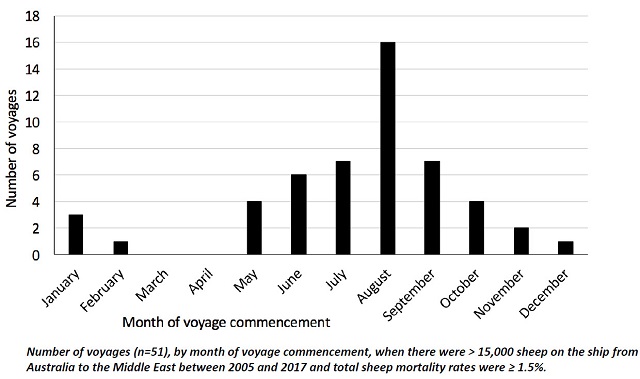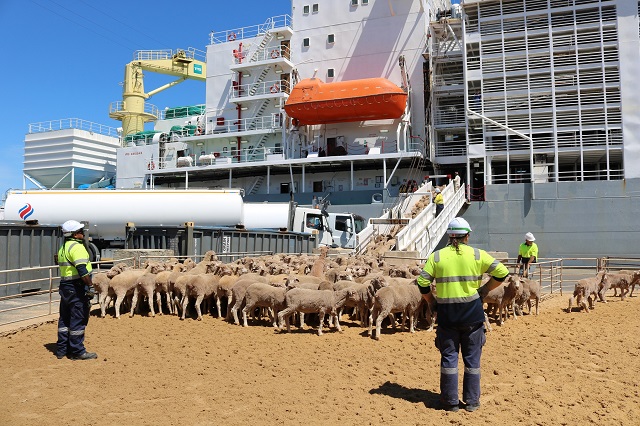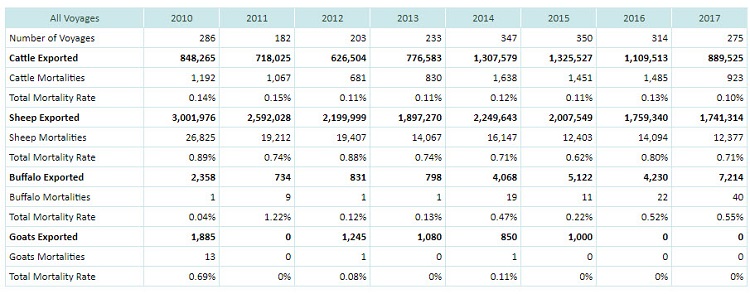Livestock and Deadstock
The Australian Government won't stop the live export of sheep to the Middle East during the northern hemisphere summer.
The most recent industry review, dubbed the McCarthy Review, released on Thursday, aimed to provide a “roadmap for the way forward” and instead called for reduced stocking densities over this time as well as independent verification of onboard ventilation systems, a requirement for automated watering systems on board and mandatory notification to the Department of Agriculture if livestock deaths exceed one percent, rather than the two percent cutoff currently required.
The Department will also continue to collaborate with the Australian Maritime Safety Authority to support accelerating the phasing out by January 1, 2019 of transitional arrangements that allow vessels constructed or converted before May 2004 to meet a lower minimum air speed across livestock pens, carry livestock in two tiers and meet lower ventilation requirements on open decks.
A statement from the Department of Agriculture, headed by Minister David Littleproud, says: “Footage released in April 2018, showing conditions for animals on a ship carrying live sheep to the Middle East on five consecutive voyages between May and November 2017 was deplorable and exposed unacceptable animal welfare outcomes. The Australian Government condemns cruelty to animals and has taken this new information very seriously.”
Not seriously enough for the RSPCA. The McCarthy Report and the government's acceptance of the results is in direct conflict with the advice of the Australian Veterinary Association, says RSPCA Chief Scientist and Strategy Officer, Dr. Bidda Jones. "These recommendations completely ignore the science and are not enough to reduce the risk of either consistent harm to animals or the catastrophic conditions we've seen previously," she said.

“It's frankly extraordinary that this review will allow May to October voyages to continue, taking winter-acclimatized animals into temperatures of more than 40 degrees and humidity of up to 80 percent. There’s no stocking density limit that can protect sheep in those kinds of conditions. A single sheep standing on a deck will suffer and can die under those heat and humidity levels. The recommendations also only require sheep be given between 11 and 39 percent more space, and that's only during the hottest and highest-risk time of the year.”
The RSPCA will now support two Private Members’ Bills that aim to phase-out live sheep exports in favor of trade in chilled and frozen meat. Jones says: “This review was meant to improve conditions for animals and address the community’s rightful outrage over this volatile trade, this industry’s callous disregard for animal welfare and its long history of reckless disdain and non-compliance with our standards.
“The Minister asked the Australian community to trust him, and assured us all that he would be tough on live export standards and reflect the science and evidence in his decision making. He assured us, even as Dr. McCarthy's independence - as a live-export-employed vet - was understandably questioned. Instead, this review has guaranteed that we will see more horrific suffering, we will see more catastrophic mortality events, and we know this because the facts and evidence show these results are entirely predictable.”
She says the Minister has betrayed the trust of the Australian public. “Just like his predecessor, he has decided against change and sided with live export companies against the Australian community. This result offers no certainty for farmers, who have been left with what is essentially a ticking time bomb, and it’s not enough to meet the Australian public’s expectations of how our animals should be treated.”
Independent Observers
Vets Against Live Exports spokesperson Dr. Sue Foster says the changes to space allowances are nothing more than window dressing and will not significantly improve the suffering and death due to heat stress.
"The Minister has claimed that his response is based on facts and science, not emotion. This is not the case. The Australian Veterinary Association (AVA), in its independent submission to the Minister, stated clearly that the only way to avoid heat stress issues in the northern summer was to stop shipments at that time. The response of the Minister has been to ignore the facts presented by the AVA and their clear and accurate summary of the science.”
Foster is also critical of the Minister's announcement that there will be an independent regulator and independent observers on every voyage. She is skeptical that it will in fact allow objective scrutiny of the “obvious problems on these voyages, as the Minister's Department was identified by the Minister himself as being a significant contributor to the culture of suppression of details of poor animal welfare suffered by sheep and cattle in the trade. Without details of the selection criteria for the regulator and the observers, and specifically whether they will be independent of the Department of Agriculture and Water Resources, we cannot know whether these proposals will improve welfare for the animals,” said Foster.
Political Divide
The federal opposition recently committed to phasing out the live sheep trade, a move welcomed by Animals Australia. "Australians overwhelmingly want the live sheep trade to end. It's pleasing that the Australian Labor Party has had the vision to recognize that there is a pathway forward that will be better for farmers, the economy and animals," said Lyn White from Animals Australia. "The live sheep trade cannot be fixed and cannot be made humane. Proactively planning for a future without live sheep export, and supporting producers during the transition, makes sense on all fronts."
In response to the McCarthy Review, Animals Australia notes that: “The cornerstone of Minister David Littleproud's announcement today was that sheep on dangerous summer shipments will be given more space. This equates to less than two A4 pieces of paper per sheep and will not prevent sheep from suffering severe heat stress.”
Animals Australia and RSPCA Australia had jointly committed $1 million towards a structural adjustment package for sheep producers if the current Turnbull government was to pursue a phase out of the live sheep trade. "A succession of economic reports have all concluded that a well-managed phase-out will ensure minimal impact on farmers. We are prepared to financially support a solution that will benefit both animals and producers," says White.
Animals Australia has released it's view on why the trade can be phased out, saying, in part:
Most Australian sheep farmers do not live export. Nearly 95 percent of the sheep ‘turned off’ in Australia each year are processed domestically for export and domestic markets. The numbers of live sheep exported to the Middle East have diminished by 60 percent in just over a decade. It is a trade in terminal decline. As the number of live sheep exported has reduced, the price of sheep has risen in Australia.
Middle East customers are now showing a clear preference for Australian fresh bagged lamb and mutton carcasses, which are flown in daily in the holds of Middle Eastern airlines. Last year, nearly 2.6 million fresh Australian lamb and mutton carcasses were flown to Middle East destinations. Another one million chilled and frozen carcasses were sent to the region by sea. Middle East customers are now buying their meat products in air-conditioned supermarkets in shopping malls. Wet markets are now a rarity. The demand for fresh and chilled Australian sheep meat products in the Middle East is now three times greater than the demand for live sheep.
The remaining demand for live sheep is driven by importing government food subsidies (widely recognized as unsustainable) and the commercial ‘value-adding’ benefits to local meat processing companies – benefits that are being lost to the Australian meat processing industry. When Bahrain removed food subsidies – live imports stopped and Australian fresh bagged carcase and chilled and frozen boxed lamb and mutton took over the market completely.
There is more than enough spare processing capacity to absorb the 1.6 million sheep exported from Western Australia last year and there is still enough spare capacity to process a further 1.4 million sheep. Global market access for Australian sheep meat has been expanding each year. Markets already exist and are growing for sheep redirected away from the live export trade.
Government-funded packages are not uncommon in the agricultural industry. In recent years, well over $2 billion in structural adjustment assistance has been provided to the dairy, sugar and tobacco industries, to name a few. Any government adjustment package would be ‘repaid’ to the economy via increased employment in the meat processing sector.

Exporters Welcome Review
The Australian Livestock Exporters Council has welcomed the findings of the McCarthy Review and agreed to overcome its past reluctance to fully engage with animal welfare groups. Chairman Simon Crean says exporters acknowledge that when any exporter has failed to uphold its animal welfare obligations, compelling questions arise about the ethics of the entire livestock export industry. The council is commissioning an independent review of its governance structures, to make recommendations about a new Code of Conduct and an Independent Industry Reform and Ethics Committee.
Crean welcomed confirmation that independent observers will be placed on livestock voyages, as well as changes in the way the regulator measures animal welfare, beyond a model based only on mortality numbers. Another key initiative will be requiring that its members publish animal welfare data for Middle East sheep exports so that any ongoing reviews of onboard conditions will have greater scientific rigor. “Industry accepts the move to broader, science-based animal welfare indicators on vessels. We will engage constructively with the Government in the development of these measures,” Crean said.
“The harsh lessons learned when our industry has not called out past welfare failures must be acted on. We must call out welfare failures and lead the cultural change required to win back public confidence.”


that matters most
Get the latest maritime news delivered to your inbox daily.
Department of Agriculture Live Export Mortality Figures 2010-2017:

